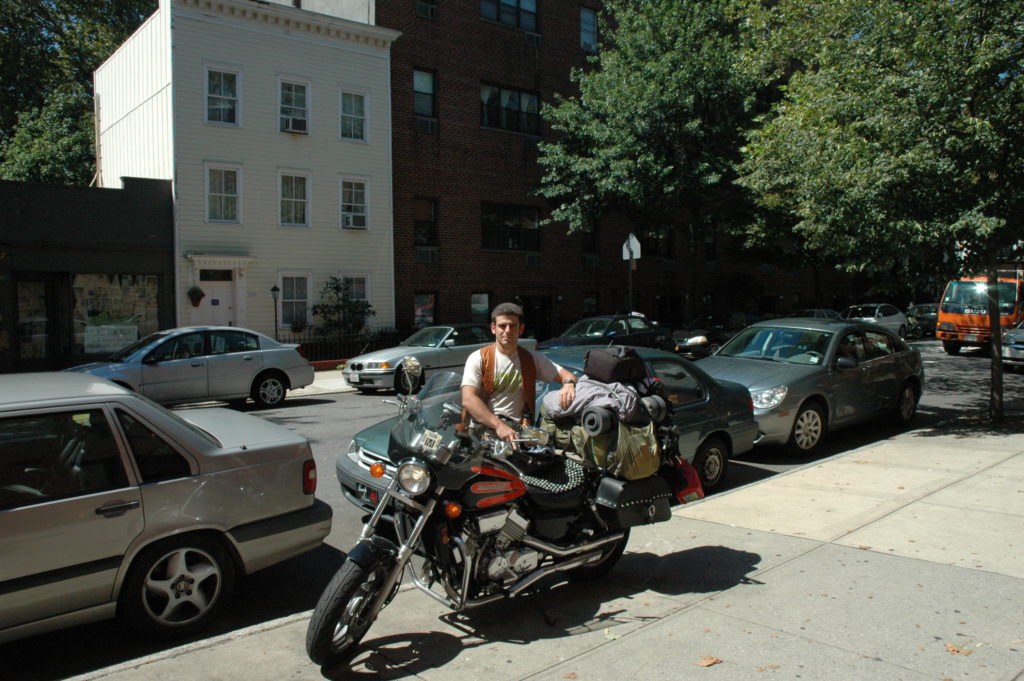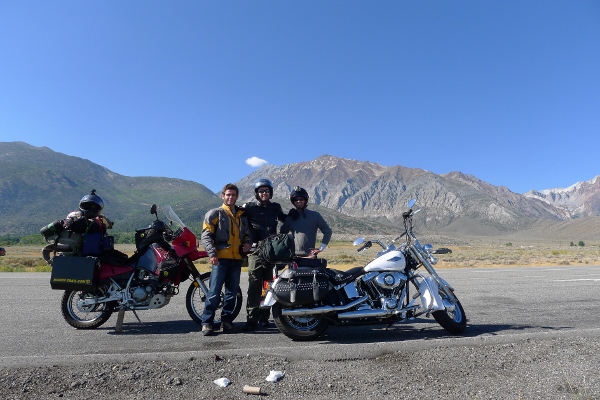After my adventures in Cocuy I was looking forward to some calm and relaxing days of riding to Venezuela… this of course was not meant to be. I think so far peace has been the hardest thing to find on my journey, as its occurrence is rarer than any other single element.
The day before leaving the town of Cocuy I met a Colombian biker. We chatted for only a few minutes about his time in Europe, the bikes we’ve ridden and parted ways. The following morning, out of nowhere, he asked if he could borrow my bike to go see the glaciers. I am still not sure why I did it, but I said yes. I didn’t even know his last name! But I let him borrow my…. Everything. I wasn’t yet recovered from the mountains and wanted to give myself another day, so leaving was no longer an issue. He’s a biker himself, so I was not concerned for him knowing how to ride, but then again… it was one of the craziest things I have done, but I was thinking of good bike Karma I suppose. To my shock, and dismay, a few minutes after he mounted Georgia, he came back around the block with a backpacker who he picked up to take up to the base camp. I had barely a moment to frown and voice my opposition when he took off. The shocks, the tires, the oil… I was not happy about this turn of events… but all I could do at that point was hope. New Year’s Day is a tough day to get rides as everyone is either still drinking or passed out, so I did not want to leave the backpacker stranded… good karma, that’s all was thinking, good karma.
The next morning I finally left Cocuy for my way last stop in Colombia: Cucuta. I was on the road only a few kilometers when I came to a small village where Georgia suddenly died. She wouldn’t start with the electric starter, nor jump-starting (no easy feat when fully loaded). Eventually she did rumble to life but thereafter threatened to die again if I dropped the throttle. Through at least three villages, down one side of a mountain and up another, I had to keep the engine revved. On slow, tight turns I kept the clutch in and the throttle wide open. I can only imagine how much gas and oil I burned up. I wasn’t sure where I could get this fixed and it was hard to ask for directions with the engine screaming. I got to the last village before the main road north, and managed to find the only mechanic there – who was of course out to lunch. As the day slipped away, so did my hopes of making it to Cucuta that night. As always, however, I spent a wonderful few hours with the mechanic and his family. He cleaned Georgia’s carb and air filter, along with a few other quick fixes and I was ready to go the next morning.
The ride from Soata to Cucuta, along the still in construction highway 55, was one of the worst and best rides so far. For the first 130km and 5 hours the road was nothing but 1st and 2nd gear. I could feel the gas, the oil and hydraulic fluid burning away as I slowly traversed, climbed and descended endless mountains and ridges. As annoying as the ride was, the scenery was unparalleled. I am never so happy – smiling like an idiot while I ride along – as when I’m in the mountains. As the sun rose to its zenith and then began its long journey to rest, the mountains revealed themselves and the little secrets they held at a given point in the day.
Long shadows of the cool morning cut deep grooves in the gullies running down both ancient, and still growing, slopes. As I rode, kicking up the dust, so too I passed through the clouds left behind the trucks – their shimmering particles lodging deep in my eyes and nose. Eventually I had to open my jacket as the temperatures climbed along with the morning star. The farms perched at precarious angles along the mountains began to lose their definition, and waves of heat and haze began to obscure the distant ranges. But bucolic farmland slowly gave way to more and more arid land, as the temperature began to drop, as I continued to climb. Until, and it felt like a single moment, the rounding of a single curve, that I beheld a cold and desolate high plain, where only low shrubs and the ubiquitous frailejones grew, close to the ground, tucked away from the chilling wind which drove a dense fog to lap and engulf the buttes and hillocks of the plateau. I trudged along in 1st or 2nd gear, mesmerized by the contrast of the lushness I had just left, and the desert like emptiness, and eeriness, of this side of the range. The fog seemed to move slowly, but as my eye wandered elsewhere for a moment, and then returned upon a spot or peak, it was gone. There were no cows anymore, not even sheep, only the hardy goats braved the cold and made the tough shrubbery their meal. A couple of horsemen in the traditional ruana and hat, with the rosy marks of windburn on their cheeks, would stare solemnly as I rode slowly past – on my way to easier climates. Clouds hung low and thick, standing guard and warning of rain, as I entered the plateau, and then again appeared as I dropped down to yet another river, and began my rise up another face, of yet another mountain. Finally the clouds began to disperse as again, I saw taller trees, evergreens, and more farms. The air began to warm, and eventually grew thicker with moisture and the bugs that are indicative of a more tropical climate. I eventually ended my constant drop and climb, and began the slow descent into the foothills of the Andes, leading towards a lush valley which could eventually bring me to the Caribbean. The day that began with a shiver, turned to heat, turned to freezing cold, and again returned to warmth, was now burning hot.
Approaching Cucuta felt like a return to the coast: people walking in shorts and tank tops, the heat of the air, the buzz of the numerous cafes along the road, the more languid movement of the people… it all reminded me of Cartagena. But Cucuta is far from the coast, and is more characterized by the undulating prosperity of Venezuela than anything else. The border town grew in response to the growing wealth and buying power of Venezuela, and continued to have its booms and busts according to the Venezuelan economy ever since. The people are of course Colombian, though different in a slight way, like every other region in the country. The women are as beautiful as ever, the people in general are friendly and open and helpful, but still there is something different – perhaps it’s not for me to tell, perhaps it’s only a difference they truly understand.
So far I have noticed that there is a distinction between people of the Atlantic coast, the Pacific coast, Antioquia (Medellin), Bogota, the northern mountains, and Cali in the south. I have not met too many indigenous peoples from the jungled regions of Colombia, like Putumayo, but I can only assume they are different as well. What’s interesting is the continued parallel of people from a given type of landscape across countries/cultures. Farmers in Guatemala and Colombia and Virginia will have more in common with each other, than people from the city in their own country. Mountain folk here are very reminiscent of those in other countries; and of course those from metropolitan centers carry similar common threads, particularly the haughtiness, obsession with fashion, and a certain worldliness, similar to big city residents around the world.
I got an unexpected, helpful and pleasant surprise when Omar invited me to stay with him in Cucuta. It made my ride shorter and meant I would not have to cross the border at night. What was to be a day turned into 4, as usual, with day trips, friends, family and food. It also gave me the opportunity to prepare myself for Venezuela.
Not only did I have to bring my own toilet paper and a stock of basic hygiene products, I wanted to bring some extra tooth paste and flour to give to my hosts along the way. This is my first time, since leaving my native Russia, entering a country where there are lines for food, for the bank, for basic services. A place where running water and electricity are not guaranteed, not because there is no infra-structure but because communist mismanagement of it means constant cuts. Never-the-less I tried not to think too much of what was to come so that I would not contaminate my experience with prejudice and false expectation. And I’m glad I didn’t as the 3 months I would spend in Venezuela would be some of the most breathtaking of my journey, and the people I would meet would become some of my closest friends.



